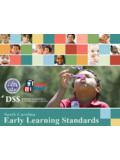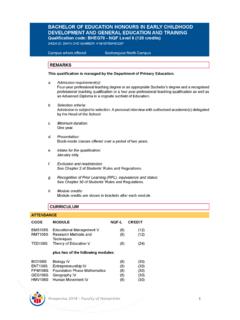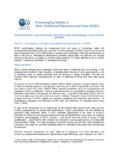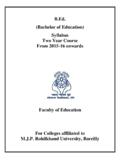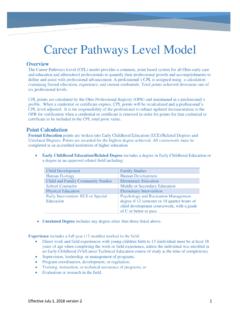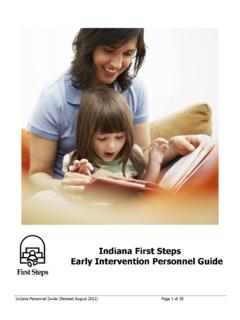Transcription of South Carolina’s Core Competencies for Early …
1 South carolina s core Competencies for Early childhood Teachers/ caregivers and Program AdministratorsTHE FOUNDATION OF EXCELLENCEA cknowledgements South carolina s core Competencies for Early childhood Teachers/ caregivers and Program Administrators was initially developed through a yearlong collaboration by Early childhood professional development organizations and providers from throughout the state. This initiative was led by Herman T. Knopf, , University of South carolina , and was coordinated by Janet Marsh, , Institute on Family and Neighborhood Life, Clemson University. Organizations represented in the South carolina Early childhood Professional Development System Committee included: ABC Child Care Program Benedict College Clemson University Columbia College EdVenture Children s Museum Furman University Head Start Collaboration Office Richland County First Steps South carolina Department of Social Services South carolina Center for Child Care Career Development State Department of Education, Office of Early childhood South carolina State University University of South CarolinaThe initial authorship of this document was shared by Dr.
2 Knopf, Sharon Lynn Kagan, , Columbia and Yale Universities, Dr. Marsh, Lynne Noble, , Columbia College, and Delores A. Stegelin, , Clemson University. Dr. Abby Thorman, Thorman Strategy Group, reviewed and revised drafts of the Competencies and ensured the content reflected best practices in the field. Barbara Hensley formatted this many documents were referenced to develop the core Competencies , particular credit and thanks is given to the core Competencies for Early Care and Education Professionals in Kansas and Missouri (second edition), which was repeatedly project was coordinated by Dr. Janet Marsh and the South carolina Center for Child Care Career Development and funded by the South carolina Department of Social Services, Child Care Services DivisionSouth carolina s core Competencies for Early ChildhoodTeachers/ caregivers and Program AdministratorsCORE Competencies 1 THE FOUNDATION OF EXCELLENCE.
3 Table of ContentsIntroduction 3 Rationale 4 Methodology 4 Organization 5 Using this Document 6 core Competencies Child Development Characteristics of Development 7 Observation and Assessment 8 CURRICULUM Curriculum and Learning Environment 9 Promoting Social and Emotional Development 10 Promoting Physical Development 11 Promoting Cognitive Development 12 Promoting Language and Literacy Development 13 HEALTH, SAFETY AND NUTRITION Health 14 Safety 15 Nutrition 16 GUIDANCE Interactions with Individual Children 17 Group Experiences 18 PROFESSIONAL DEVELOPMENT Family and Community Relationships 19 Advocacy and Leadership 20 Ethics 21 Professionalism 22 References 232 core COMPETENCIESI ntroductionThe Foundation of Excellence.
4 South carolina s core Competencies for Early childhood Teachers/ caregivers and Program Administrators outlines the knowledge, skills, and dispositions needed by Early childhood professionals working with children from birth to school age in any Early care and education document is built on the knowledge that all children: Develop best in environments that provide meaningful and relevant learning opportunities; Construct their knowledge of the world through activities, experiences and interactions with others; Thrive when their needs are recognized, respected and addressed; Develop to their fullest potential when adults form nurturing relationships and create environments and experiences that are inclusive of their cultures and differing needs and Competencies 3 Rationale Why define core Competencies ?The quality of care and education services impacts children s academic and social outcomes (Abbott-Shim, Lambert, & McCarty, 2000; Burchinal et al.)
5 , 2000; Burchinal & Cryer, 2003; Ceglowski, 2004; Kreisman, 2003; NICHD Early Child Care Research Network, 2002; Peisner-Feinberg et al., 1999; Phillips, Mekos, Scarr, McCartney, & Abbott-Shim, 2000; Tzuriel, Kaniel, & Kanner, 1999). Children who participate in high quality care and education programs are better prepared to begin formal schooling with the knowledge, skills, and dispositions needed for preparation/professional development is one of the most important contributors to the quality of programs . Teachers with degrees specific to Early childhood education or participation in ongoing professional development provide better outcomes for the children they serve (NICHD Early Child Care Research Network, 2002) and create classrooms with higher global ratings of quality (Blau, 2000; de Kruif, McWilliam, Ridley, & Wakeley, 2000; Howes, Whitebook, & Phillips, 1992; NICHD Early Child Care Research Network, 2002; Scarr, Eisenberg, & Deater-Deckard, 1994).
6 MethodologyTo inform this work a survey on core knowledge priorities was completed by hundreds of individuals who represented a wide variety of stakeholders, including parents, grandparents, infant/toddler teachers and assistants,preschool teachers and assistants, family child care providers, nannies, program administrators, and others. The surveys were distributed at local Early childhood conferences and professional development training sessions through the South carolina Early childhood Association, South carolina Association for the Education of Young Children, and through the State Department of Education Office of Early survey data was aligned with the South carolina Department of Social Services Child Care Licensing Regulations, ABC Program Standards and the professional development standards from the National Association for the Education of Young Children. The content areas were then refined through reviewing other state s core knowledge/ Competencies documents, best practices in teacher preparation, and current research and recommendations related to teacher preparation from various sources.
7 Dr. Sharon Lynn Kagan reviewed the initial document and provided important direction for the reviewers included: Dr. Floyd Creech, Florence School District One Mrs. Donna Davies, Center for Child Care Career Development Dr. Nancy Freeman, University of South carolina Dr. Janet Marsh, Clemson University Ms. Ann Pfeiffer, Center for Child Care Career Development Dr. Louester Robinson, Trident Technical College Dr. Abby Thorman, Thorman Strategy Group Dr. Linda Weaver-Griggs, York Technical College4 core COMPETENCIESO rganizationThe core Competencies are divided into five content areas:I. Child Development A. Characteristics of Development B. Observation and AssessmentII. Curriculum A. Curriculum and Learning Environment B. Promoting Social and Emotional Development C. Promoting Physical Development D. Promoting Cognitive Development E.
8 Promoting Language and Literacy DevelopmentIII. Health, Safety and Nutrition A. Health B. Safety C. NutritionIV. Guidance A. Interactions with Individual Children B. Group ExperiencesV. Professional Development A. Family and Community Relationships B. Advocacy and Leadership C. Professionalism D. EthicsTo help young children arrive at school prepared for success, South carolina must provide high quality Early childhood professional development with content that increases participants levels of five content areas each have three levels of expertise based on training, education and experience. The levels establish a continuum from the preliminary skills necessary to begin work with young children to a mastery of Early childhood knowledge and Competencies . Early childhood teachers/ caregivers and program administrators move from one level to another through a combination of formal study, training and reflection on practice.
9 The levels are:Level 1: Knowledge and skills expected from someone who may be new to the field or who has little formal training in Early care and education. The South carolina Early childhood Credential or the South carolina Director Credential provide training in all Competencies at this 2: Knowledge and skills expected from someone who has at least a year of experience, possesses the knowledge and skills of the previous level AND holds an associate s degree in Early Care and Education or Program 3: Knowledge and skills expected from someone who has at least two years of experience, possesses the knowledge and skills of the two previous levels AND holds a bachelor s degree or above in Early childhood Education or a closely related Competencies 5 Using this DocumentThis core Competencies document provides another important step in the development of a strong Early childhood professional development system in South carolina .
10 There are many different ways to use this document:Teacherand caregivers can use the core Competencies to: Assess current knowledge and skills Identify areas for personal professional growth and development Design a professional development planProgram administrators can use the core Competencies to: Assess current knowledge and skills Identify areas for personal professional growth and development Identify areas for professional growth and development for individual staff and program overall Plan training content for staffTrainers and training organizations can use the core Competencies to: Plan training content Work with programs to tailor trainings to meet individual and program needsHigher education institutions can use the core Competencies to: Evaluate and refine course content Coordinate articulation agreementsEarly childhood agencies can use the core Competencies to: Coordinate interagency communication Plan training, technical assistance, or other supports Connect stakeholders around common goals6 core COMPETENCIESI-A.
